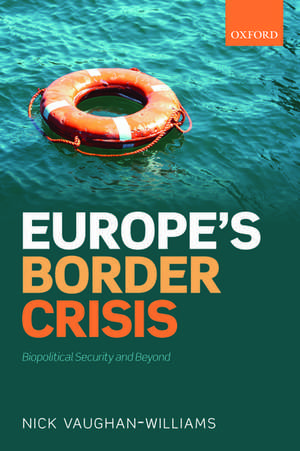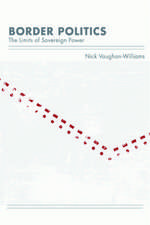Europe's Border Crisis: Biopolitical Security and Beyond
Autor Nick Vaughan-Williamsen Limba Engleză Paperback – 6 sep 2017
| Toate formatele și edițiile | Preț | Express |
|---|---|---|
| Paperback (1) | 184.23 lei 31-37 zile | |
| OUP OXFORD – 6 sep 2017 | 184.23 lei 31-37 zile | |
| Hardback (1) | 626.44 lei 31-37 zile | |
| OUP OXFORD – oct 2015 | 626.44 lei 31-37 zile |
Preț: 184.23 lei
Preț vechi: 227.72 lei
-19% Nou
Puncte Express: 276
Preț estimativ în valută:
35.25€ • 36.37$ • 29.42£
35.25€ • 36.37$ • 29.42£
Carte tipărită la comandă
Livrare economică 15-21 martie
Preluare comenzi: 021 569.72.76
Specificații
ISBN-13: 9780198806790
ISBN-10: 0198806795
Pagini: 192
Dimensiuni: 155 x 232 x 11 mm
Greutate: 0.3 kg
Editura: OUP OXFORD
Colecția OUP Oxford
Locul publicării:Oxford, United Kingdom
ISBN-10: 0198806795
Pagini: 192
Dimensiuni: 155 x 232 x 11 mm
Greutate: 0.3 kg
Editura: OUP OXFORD
Colecția OUP Oxford
Locul publicării:Oxford, United Kingdom
Recenzii
Europe's Border Crisis is a work of great interest, which integrates socio-political and philosophical analysis. Drawing on biopolitical paradigms in contemporary political philosophy, it finds keys for interpreting current dynamics within immigration policies and their antinomic consequences. It is a useful and original book that progresses research in this field of study.
Since the second half of 2015, Europe's focus has been on closing the borders, striking a deal with Turkey to take back refugees from Greece, and shutting down the Balkan route that many thousands took to Northern Europe beforehand. Is there any way to understand these developments, beyond emotional judgements such as callous and deadly or harsh but necessary? Vaughan-Williams, whose book is aimed at broadening the scope of academic research on borders and migration, argues for a new way of seeing the problem.
Europe's Border Crisis is a dense, provocative and timely reflection on the debate on border security and migration management in Europe and beyond. The remarkable and innovative work of Nick Vaughan-Williams constitutes a step forward in migration and border studies.
Europe's Border Crisis is essential reading for students of political theory and International Relations. Nick Vaughan-Williams skillfully combines a sophisticated interpretation of the main paradigms of biopolitics with a rich empirical analysis of EU border security policies in a powerful critique of the very foundations of contemporary European politics. He also articulates an affirmative politics of the border, in which the encounter between self and other does not take the exclusionary and violent forms that we observe all around us today.
Nick Vaughan-Williams' book offers an intellectually stimulating and conceptually challenging and rich discussion of what he terms 'Europe's border crisis.' In view of tragic deaths and human suffering at European/ EU external borders, this book makes a timely intervention in academic and non-academic debates on the controversial politics and paradoxical effects of EU border and migration policies and practices at diverse scales and spaces.
Since the second half of 2015, Europe's focus has been on closing the borders, striking a deal with Turkey to take back refugees from Greece, and shutting down the Balkan route that many thousands took to Northern Europe beforehand. Is there any way to understand these developments, beyond emotional judgements such as callous and deadly or harsh but necessary? Vaughan-Williams, whose book is aimed at broadening the scope of academic research on borders and migration, argues for a new way of seeing the problem.
Europe's Border Crisis is a dense, provocative and timely reflection on the debate on border security and migration management in Europe and beyond. The remarkable and innovative work of Nick Vaughan-Williams constitutes a step forward in migration and border studies.
Europe's Border Crisis is essential reading for students of political theory and International Relations. Nick Vaughan-Williams skillfully combines a sophisticated interpretation of the main paradigms of biopolitics with a rich empirical analysis of EU border security policies in a powerful critique of the very foundations of contemporary European politics. He also articulates an affirmative politics of the border, in which the encounter between self and other does not take the exclusionary and violent forms that we observe all around us today.
Nick Vaughan-Williams' book offers an intellectually stimulating and conceptually challenging and rich discussion of what he terms 'Europe's border crisis.' In view of tragic deaths and human suffering at European/ EU external borders, this book makes a timely intervention in academic and non-academic debates on the controversial politics and paradoxical effects of EU border and migration policies and practices at diverse scales and spaces.
Notă biografică
Nick Vaughan-Williams is Professor of International Security and Head of the Department of Politics and International Studies at the University of Warwick, UK. From 2016 to 2019 he holds the Philip Leverhulme Prize for outstanding research in Politics and International Relations. His programme of research, supported with grants from the British Academy, UK Economic and Social Research Council, and Leverhulme Trust, focuses on the relationship between sovereignty, subjectivity, and the spatial dimensions of security particularly the changing nature of borders and bordering practices in global politics. His book Border Politics: The Limits of Sovereign Power (2009, 2012) was Gold Winner of the Association for Borderlands Studies Book Award. He is co-author of Critical Security Studies: An Introduction (2010, 2014) and Everyday Security Threats: Perceptions, Experiences, Consequences (2016).
















